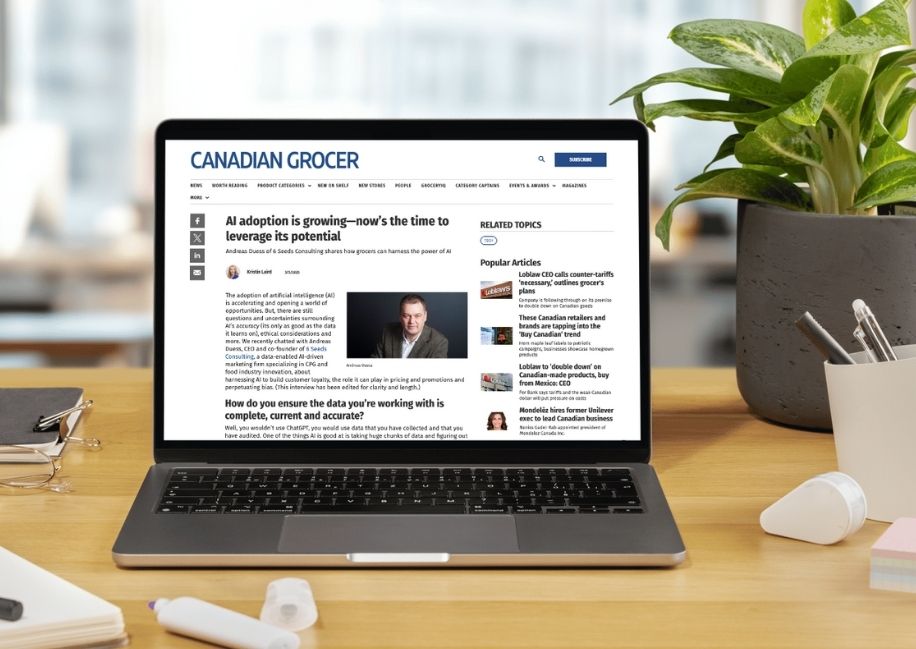The grocery industry is at a turning point. AI is no longer a futuristic idea—it’s here, and it’s reshaping the way retailers operate. But are grocers ready to fully harness its potential?
Canadian Grocer recently sat down with Andreas Duess, CEO and co-founder of 6 Seeds, to explore how AI can drive customer loyalty, optimize pricing and promotions, and help independent retailers compete with larger chains.
AI and Customer Loyalty: The Power of Knowing Your Shopper
In today’s data-driven world, consumers expect personalization. According to Andreas, “If I feel you know me and do things that benefit me, I will be yours forever.” The key to customer loyalty isn’t just offering discounts—it’s about understanding your shoppers on a deeper level.
Take a parent feeding a house full of teenagers. If a grocery retailer provides a newsletter or meal-planning suggestions tailored to their needs (e.g., “How to Feed Three Teenage Boys Without Breaking the Bank”), that’s more than a transaction—it’s building a relationship. AI can analyze shopping habits and provide these kinds of insights at scale.
AI’s Role in Pricing and Promotions
Andreas highlights the rise of GLP-1 weight-loss drugs like Ozempic and how they’re shifting consumer behavior. “In two years, 38% of the U.S. population will be on a GLP-1 drug,” he says. This means portion sizes, product formulations, and consumer priorities are changing—and grocers must adapt. AI can help identify emerging trends and adjust product offerings accordingly.
For example, AI can optimize private label product development by analyzing ingredient databases and recommending high-fiber, nutrient-dense, affordable options that resonate with health-conscious shoppers.
Where AI Goes Wrong (and Right) in Retail
One of the biggest mistakes retailers make with AI? Trying to outsource creativity to it.
“AI should never replace human meaning-making,” Andreas explains. “AI is amazing at sense-making—it finds patterns in data—but it takes humans to create stories that resonate.” Retailers should use AI to surface insights and combine them with human intuition to craft compelling marketing and merchandising strategies.
Competing with Big Chains: AI as an Equalizer
Smaller grocery retailers often believe AI is only for the big players, but that’s a myth. “An independent grocer can use AI in small but impactful ways,” says Andreas.
Take, for example, a retailer who used AI to analyze sales data against weather patterns to predict optimal times for promotions. “Really clever stuff you can do in a humble way, but that will still help you,” he says.
By leveraging AI for inventory management, personalized promotions, and shopper insights, smaller retailers can compete more effectively without massive budgets.
The Future of AI in Grocery: Adapt or Struggle
Looking ahead, Andreas is clear: AI will define the winners and losers in grocery retail.
“By the end of 2025 or 2026, there will be two kinds of brands—those that use AI and those that go bankrupt,” he predicts. The industry is shifting rapidly, and grocers who fail to embrace AI’s potential risk falling behind.
For grocery leaders, the message is clear: work with your data, move quickly, and embrace AI as a tool to elevate—not replace—human expertise.
